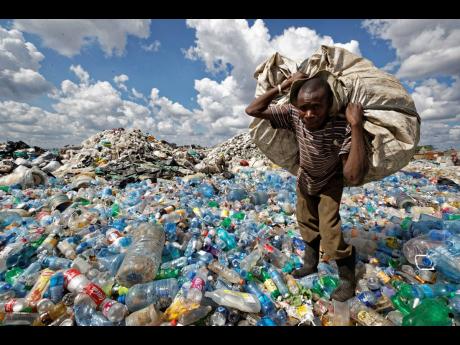Elizabeth Morgan | Production, trade and disposal of plastics
…Breaking the plastics habit
This month of May is unusually hot with little rain, resulting in yet another bout of water restrictions in Kingston. According to Minister Matthew Samuda, Jamaica is experiencing one of the worst droughts on record. This is most likely due to climate change.
I see recycling companies taking ages to collect plastic waste and plastic bottles and bags strewn all over the place, clogging up drains. Plastics, made from fossil fuels, contribute to global warming, and I am reading that the Caribbean islands are among the world’s largest plastics polluters due to poor collection and disposal of wastes. It is recorded that over 80 per cent of litter in the Caribbean Sea is plastics either originating in the region or from other areas. Marine and coastal environments are of vital importance to the economies of CARICOM countries increasingly dependent on tourism and marine resources.
It came to my attention on the weekend that a very important meeting is taking place in Paris, France, this week, organised by the United Nations Environment Programme (UNEP). This is the second session of the Intergovernmental Negotiating Committee on Plastics Pollution (INC-2).
Here in Jamaica and in other CARICOM countries, action has been taken to restrict the use of single-use plastic bags, and more measures should be coming.
The CARICOM Secretary General, Dr Carla Barnett, addressing a meeting on Marine Spatial Planning in April 2022, spoke of the need to “break up with plastics”. She noted, “We have grown comfortable in a reality where plastic packaging is discarded mere minutes after purchase, but persists in the environment for hundreds of years.”
CARICOM Heads of Government, at their 40th session in St Lucia, July 3-5, 2019, adopted the St John’s Declaration aimed at addressing the high levels of plastics and microplastics in the Caribbean Sea and their adverse impact on Caribbean sustainable development.
CARICOM countries have been active at the UN climate change conferences, COP26 and COP27, and at the annual UNEP assemblies in Nairobi, Kenya. The UNEP meetings do not get a lot of media coverage.
At the UNEP Assembly in February 2022, a resolution was adopted to develop an internationally binding treaty on plastics pollution, which will address the full lifecycle of plastics and, ambitiously, should be completed in 2024.
WHY IS THIS NECESSARY?
Plastic was first invented and patented in 1907 as Bakelite. It was further developed and came into more common use during World War II. It was regarded as a miracle product, reducing the use of natural materials such as paper, ivory and tin. It revolutionised production, trade, packaging, medicine, transportation, equipment and devices, among others. It was so much more convenient. It reduced cost and made products more accessible and affordable. One could open a bottle or a package, then just throw it away. One did not have to get equipment repaired anymore. It heralded excessive accumulation and the throw-away culture.
And then, the miracle turned into a nightmare. The problems started to manifest themselves. Earth was engineered by its Creator to ensure that everything could be regenerated or reabsorbed. Man-made plastic was not biodegradable. It would take years, possibly centuries, to degrade. Its disposal was a mammoth problem. The volume of plastics was increasing exponentially and it was not just a problem on land, but also in the waterways.
SOME DISTURBING FACTS
• More than half of all plastics were made in the last 20 years;
• In 1950, 2.3 million tons of plastics were produced; today, about 480 million metric tonnes of plastics are being produced, and this could be tripled by 2050;
• Two-thirds of plastic production are discarded, and most often after a single use, ending up in rivers, lakes and seas, and on beaches and cays;
• Less than 10 per cent is recycled worldwide and recycling is only a partial solution to the problem;
• 99 per cent of plastics are made from fossil fuels;
• Plastics release as much as 850 metric tonnes of greenhouse gases into the atmosphere, contributing to global warming.
On INC-2, Inger Andersen, UNEP executive director, told a meeting in Paris on May 26 that the international community, in negotiating this new treaty, has a chance to edge closer to protecting ecosystems, species, and humanity from the grave impacts of the linear plastics economy, and to show leadership, determination, and ambition.
For her, ambition includes achieving the following:
• Re-designing to reduce plastic in products, possibly through deliquefying products or changing packaging;
• Making it easier to repair, reuse, refill, and recycle, so that circularity becomes possible;
• Providing incentives to make recycled polymers cheaper than virgin plastics;
• Supporting research and development on sustainable alternatives to plastics;
• Building waste management infrastructure that can cope with the load;
• Creating new jobs, new markets, and new business opportunities;
• Ensuring that waste-pickers and vulnerable communities have decent jobs and a safe, healthy environment; and
• Ensuring that legacy plastic arriving on the shores of small island states or developing countries, many decades after the treaty’s implementation, can be addressed .
Are the people of Jamaica and other CARICOM countries prepared to support this international treaty to drastically reduce plastics use, thus demonstrating their willingness to break their plastics habit, and learning to live without it? It seems we must in our own interest and, generally, that of the planet and humanity. The evidence is before us.
If May is so hot, I cannot imagine what August will be like, and worse, if there is still no substantial rainfall!! And, indeed, what could happen when there is substantial rain!!
This is another example of why trade a multidisciplinary subject and mainstreaming is necessary.
Elizabeth Morgan is a specialist in international trade policy and international politics. Email feedback to columns@gleanerjm.com.

